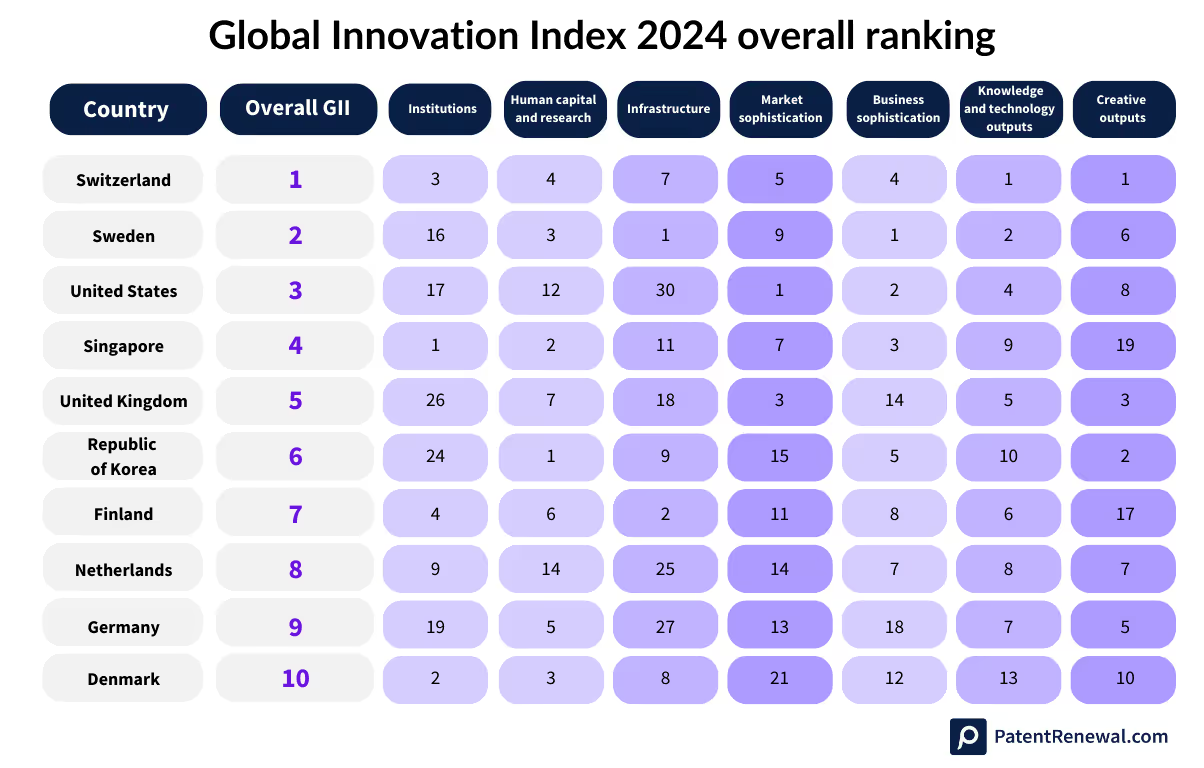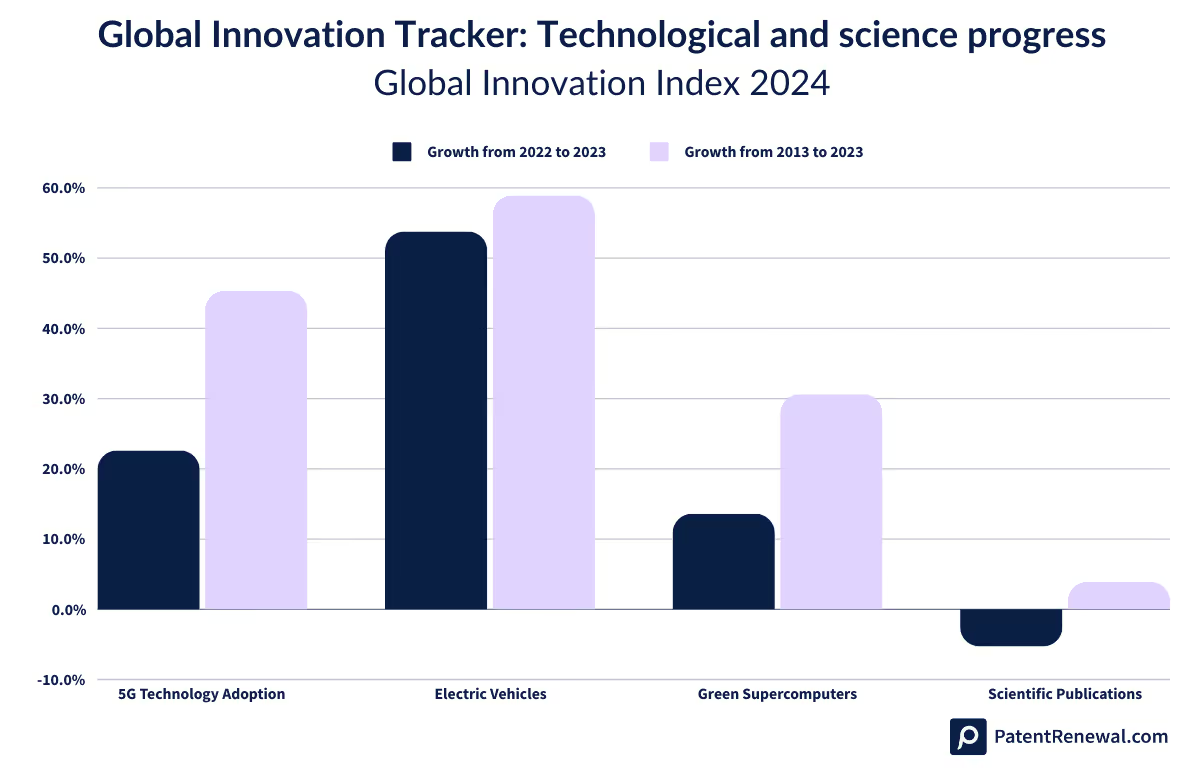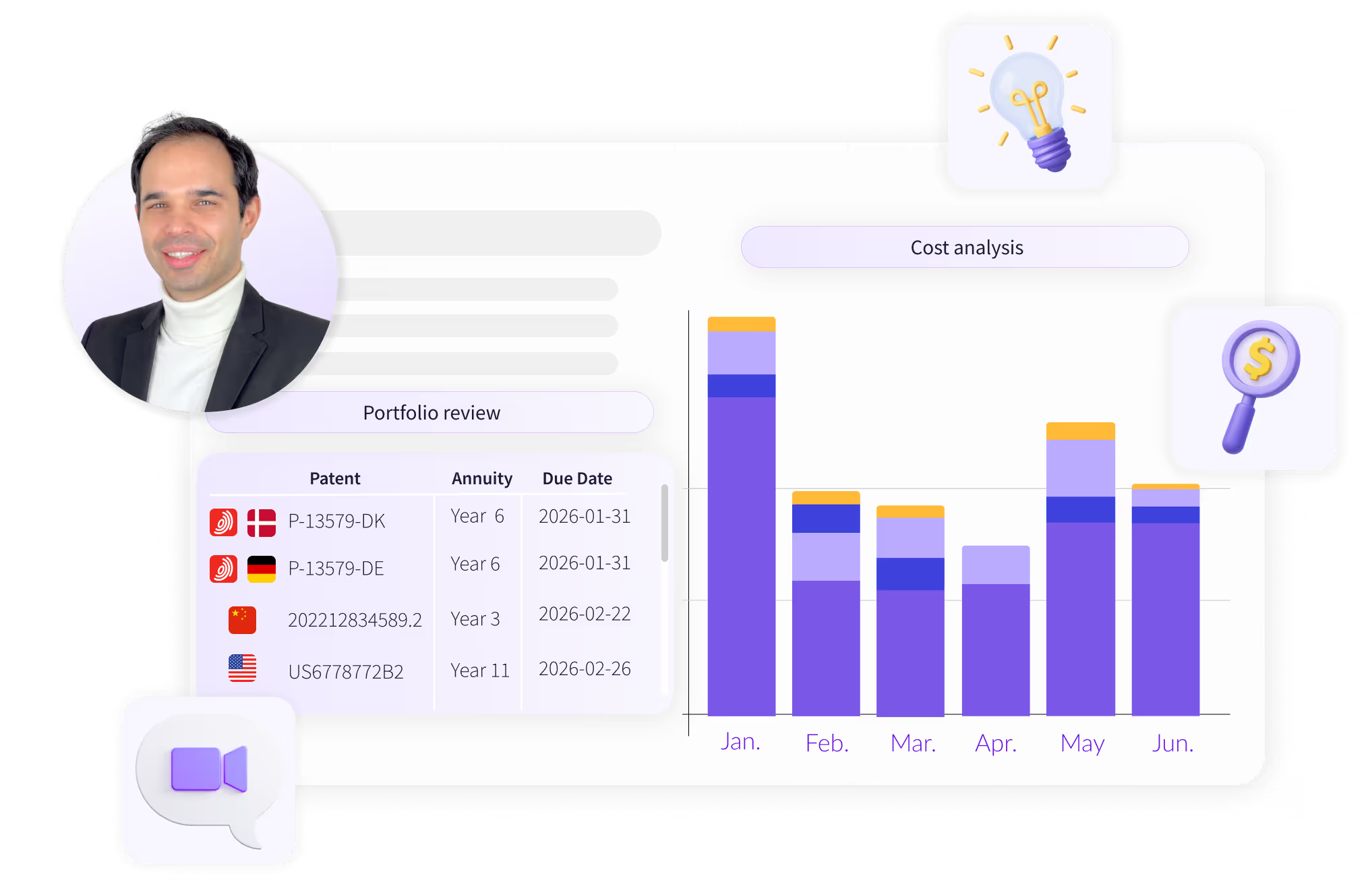TRY OUR NEW (FREE) IP RENEWAL COST CALCULATOR
Calculate
.avif)
The WIPO Global Innovation Index (GII) 2024 provides a comprehensive look at how innovation is shaping economies worldwide, covering 133 countries.
This year's report highlights major shifts in innovation rankings, the rise of social entrepreneurship, and key global trends in technological progress and investment. If you're interested in how different countries' patent landscapes are evolving or looking for insights into emerging trends in innovation, the GII 2024 offers valuable data. Let’s explore the top insights, country rankings, and key statistics.
The GII 2024 ranks countries based on their ability to foster and produce innovation through a mix of innovation inputs and innovation outputs. Inputs include factors like institutions, human capital, infrastructure, and business conditions that support innovation. Outputs look at tangible results, such as patents, technology creation, and creative goods.
The top 10 countries leading in innovation this year are:
Denmark excelled in institutions (2nd) and human capital and research (3rd). Known for its strong focus on entrepreneurship and sustainable technology, Denmark also performs well in creative outputs (10th) and infrastructure (8th), making it a key player in green and social innovation.
Germany holds its place with a strong performance in human capital and research (5th) and business sophistication (18th). The country also ranks 7th in knowledge and technology outputs, reflecting its industrial strength and innovative capabilities, particularly in the high-tech manufacturing and engineering sectors.
The Netherlands is a global leader in institutions (9th) and creative outputs (7th). It also excels in business sophistication (7th) and market sophistication (14th), showing strong university-industry collaboration and a thriving startup ecosystem that supports technological advancement.
Finland stands out in infrastructure (2nd) and institutions (4th). Its strong innovation ecosystem is driven by sustainability and smart technology development, and Finland ranks 6th in knowledge and technology outputs, contributing significantly to its competitive edge in digital innovation.
Korea moves up to 6th place in 2024, making notable strides in human capital and research (1st) and business sophistication (5th). It leads in R&D expenditures (2nd) and R&D performed by businesses (1st), and ranks 10th in knowledge and technology outputs, underscoring its strength in high-tech industries and export complexity.
The UK maintains its position, excelling in market sophistication (3rd) and creative outputs (3rd). With strong human capital and research (7th), the UK fosters a highly innovative environment, supported by top-tier universities and a vibrant tech ecosystem.
Singapore continues its ascent, moving further into the top 5 by ranking 1st in institutions and 2nd in human capital and research. It holds the greatest number of GII indicators ranking 1st (14 out of 78), overtaking the United States in key areas such as university quality and software spending. Despite excelling in innovation inputs, it still lags behind the overall top 3 countries in creative outputs (19th).
The U.S. keeps its position in the global innovation list, ranking 1st in market sophistication and business sophistication. It leads the world in several indicators, including the quality of its universities, the H-index of scientific publications, and IP receipts, underscoring its strength in research and knowledge creation. However, it ranks lower in infrastructure (30th), which slightly impacts its overall innovation efficiency.
Sweden ranks 2nd, maintaining its position for the second consecutive year. It leads in infrastructure (1st), business sophistication (1st), and knowledge and technology outputs (2nd). Sweden's strong performance is further reinforced by its top rankings in researchers (1st), IP payments (1st), and knowledge-intensive employment (3rd), showcasing its well-developed innovation ecosystem.
Switzerland ranks first for the 14th consecutive year and continues to lead in knowledge and technology outputs and creative outputs (both 1st). Although its infrastructure ranking is lower (7th), it remains in the top 5 for all other GII pillars, making it the most balanced and consistently high-performing country in global innovation. Switzerland's leadership in both inputs and outputs solidifies its position as the world's top innovator.

Several countries showed significant progress in the 2024 GII rankings:
Compared to the 2023 report, countries like China, India, and Türkiye have continued to improve their innovation ecosystems. China maintains its rank in the top 15, while India and Türkiye have made strides in innovation inputs and outputs.
Economies that overperform in innovation relative to their development levels include:
These countries exemplify how strategic and social innovation practices and supportive patent policies can lead to growth and competitiveness, even with limited resources.
After a growth spurt between 2020 and 2022, the report reveals a downturn in global innovation investment in 2023. Venture capital investments saw a significant drop of 36% in 2022 and further declined by 39% in 2023, returning to pre-pandemic levels. This trend poses challenges for startups and innovators relying on external funding.
In the long term, however, venture capital deal values have shown 13.8% annual growth over the past decade (2013–2023), indicating that while there may be short-term disruptions, there is still overall long-term confidence in innovation financing.
The WIPO GII 2024 places a significant focus on social entrepreneurship, highlighting its growing role in driving innovation and addressing critical societal challenges. Social enterprises contribute around 2 trillion dollars to global GDP, offering sustainable solutions to issues like poverty and environmental sustainability.
With 30 million social entrepreneurs globally, the report emphasizes the untapped potential of this sector and calls for governments to align policies and investment strategies to better support these innovators. Strengthening social entrepreneurship can greatly enhance socio-economic impact, especially for countries looking to improve their patent frameworks for more inclusive growth.
Despite investment challenges, tech adoption continues to grow. 5G technology has seen rapid uptake, with 22.6% growth in adoption from 2022 to 2023. The long-term growth (from 2021 to 2023) has been an impressive 45.3%. This indicates a surge in connectivity and the potential for more robust digital services and innovations globally.
The adoption of electric vehicles has surged by an impressive 53.8% between 2022 and 2023, signifying strong momentum toward greener technologies and sustainable transportation. In the long term, electric vehicle adoption has grown 58.9% annually from 2013 to 2023, marking a significant shift in consumer and industry focus toward green mobility.
There’s been a steady improvement in the performance of supercomputers worldwide, which continues to support tech-driven innovation. Green supercomputers have shown significant improvements, with a 13.6% increase from 2022 to 2023. Over the past decade, the performance of green supercomputers has improved by 30.6% annually (2013 to 2023), reinforcing their growing role in data processing.
In 2023, the number of scientific publications saw a 5% decrease, indicating slower research output after several years of strong growth. This decline could point to broader funding or collaboration hurdles in the research community, despite advances in computing power.

The WIPO Global Innovation Index 2024 captures a mixed landscape of progress and challenges in global innovation. While investment in R&D and venture capital has seen a decline, strides in technology adoption, sustainability, and social entrepreneurship mark positive steps forward.
At PatentRenewal.com, we understand the challenges of keeping up with the innovation landscape. Check out our solution for automated and cost-effective patent, design, and utility model renewals. Discover how you can save up to 50% on your annual IP renewal costs.
Interested in a free IP renewal consultation? Benchmark your current IP renewal setup and costs against market standards.
